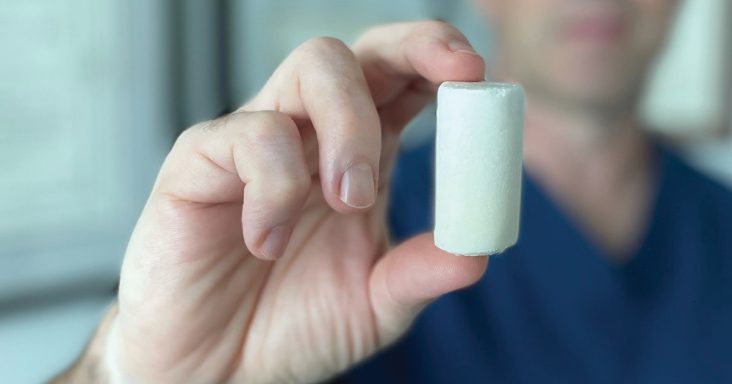Northwest Health offers new ACL treatment
by July 31, 2022 10:46 am 1,479 views

A decellularized, bovine-derived, type 1 collagen implant is used in a new treatment for anterior cruciate ligament (ACL) tears. The implant is placed as a bridge between the existing ACL and the rest of the knee. The implant resorbs into the body within eight weeks of implantation, and the ACL regrows itself. (PHOTO BY MIACH ORTHOPAEDICS)
Healthcare provider Northwest Health has started to provide a new treatment for anterior cruciate ligament (ACL) tears, one of the most common knee injuries in the United States.
According to a news release, Northwest Medical Center – Bentonville is the first in Arkansas to offer the bridge-enhanced repair implant to treat ACL tears.
Dr. Christopher Dougherty performed the first implant treatment on Feb. 3 at the hospital. So far this year, he has completed six. Dougherty is a sports medicine and orthopedic surgeon at Agility Center Orthopedics.
“This new implant and the bridge-enhanced ACL repair technique is a game-changer,” Dougherty said. “For the first time, you can actually restore your ACL and regrow it. The surgery has a chance to recreate your natural knee and unlike repairs with grafts, lets you take your knee back to time zero before injury.”
The release shows the new implant is the first to enable the body to heal its own torn ACL. The new approach is a shift from the existing standard of care – reconstruction that replaces the ACL with a graft – and is the first innovation in ACL tear treatment in more than 30 years.
Unlike reconstruction, the new procedure does not require a second surgical wound site to remove a healthy tendon from another part of the leg or the use of a donor tendon. The implant acts as a bridge to help ends of the torn ACL heal together. As the ACL heals, the implant is resorbed by the body, within about eight weeks.
Each year, about 400,000 ACL injuries happen in the United States. A torn ACL does not heal without treatment, and ACL reconstruction is one of the most common orthopedic procedures. According to the release, about half of people who receive patellar tendon grafts experience pain while kneeling, and those who receive hamstring grafts could have persistent weakness – as much as a 50% deficit at two years after surgery.
